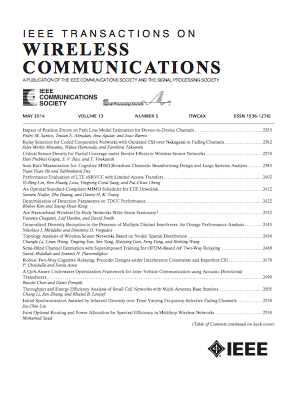基于OTFS的TDD系统密钥生成与保密分析
IF 10.7
1区 计算机科学
Q1 ENGINEERING, ELECTRICAL & ELECTRONIC
引用次数: 0
摘要
物理层密钥生成技术旨在从无线信道中包含的信息中提取密钥。然而,现有的密钥生成方案往往依赖于时频域波形进行信道估计,这不仅降低了秘密提取的可靠性,而且可能损害提取的秘密信息的机密性。提出了基于时频空间正交(OTFS)波形的物理层密钥生成方法。我们的分析表明,使用OTFS获得的延迟多普勒域信道估计比使用流行的正交频分复用(OFDM)获得的时频域信道估计更有利于安全可靠的秘密提取。这种分析在某些简单的假设下提供了理论上的保证。然后,我们在大量的时分双工(TDD)模拟中放宽了这些假设,并表明在实际设置下,OTFS在可靠性和安全性方面提供了预期的好处。我们的仿真表明,在时频域方法恶化的情况下,引入的OTFS方案可以可靠地从信道估计中提取密钥。本文章由计算机程序翻译,如有差异,请以英文原文为准。
Key Generation and Secrecy Analysis Using OTFS for TDD Systems
Physical layer key generation techniques aim to extract secret keys from the information contained in wireless channels. However, existing key generation schemes often rely on time-frequency domain waveforms for channel estimation, which not only makes secret extraction less reliable but may also compromise the confidentiality of the extracted secret information. This paper presents physical layer key generation methods relying on the Orthogonal Time Frequency and Space (OTFS) waveform. We present analysis showing that the delay-Doppler domain channel estimates obtained using OTFS are conducive to more secure and reliable secret extraction than time-frequency domain channel estimates obtained using the prevalent Orthogonal Frequency Division Multiplexing (OFDM). This analysis provides theoretical guarantees under certain simple assumptions. We then relax those assumptions in extensive time-division duplex (TDD) simulations and show that under realistic settings, OTFS offers the expected benefits to reliability and security. Our simulations show that the introduced OTFS schemes can reliably extract secret keys from channel estimates in scenarios where time-frequency domain methods deteriorate.
求助全文
通过发布文献求助,成功后即可免费获取论文全文。
去求助
来源期刊
CiteScore
18.60
自引率
10.60%
发文量
708
审稿时长
5.6 months
期刊介绍:
The IEEE Transactions on Wireless Communications is a prestigious publication that showcases cutting-edge advancements in wireless communications. It welcomes both theoretical and practical contributions in various areas. The scope of the Transactions encompasses a wide range of topics, including modulation and coding, detection and estimation, propagation and channel characterization, and diversity techniques. The journal also emphasizes the physical and link layer communication aspects of network architectures and protocols.
The journal is open to papers on specific topics or non-traditional topics related to specific application areas. This includes simulation tools and methodologies, orthogonal frequency division multiplexing, MIMO systems, and wireless over optical technologies.
Overall, the IEEE Transactions on Wireless Communications serves as a platform for high-quality manuscripts that push the boundaries of wireless communications and contribute to advancements in the field.

 求助内容:
求助内容: 应助结果提醒方式:
应助结果提醒方式:


